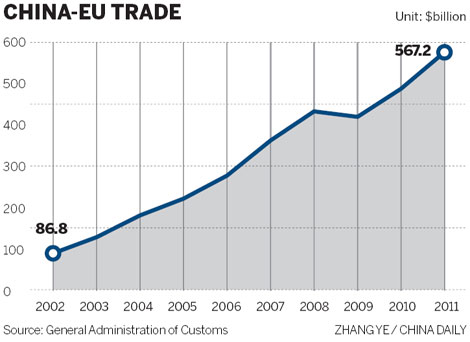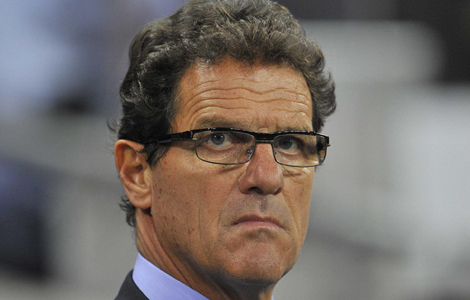Experts: EU statement opens door to status
Updated: 2012-02-16 09:33
By Fu Jing and Ding Qingfen (China Daily)
|
|||||||||||
BRUSSELS/BEIJING - Beijing and Brussels are showing an "unusual determination" to grant China market economy status quickly but the path toward that goal is still unknown, Chinese and European experts say.
Those observations came out after officials from both sides announced in a five-page communiqué that they "have realized the significance of addressing the issue of market economy status swiftly and comprehensively".
|
 |
The bestowal of market economy status means that a country is recognized by other countries as having a market economy, entitling it to certain protections in trade disputes.
The document was made public following a summit meeting on Tuesday among Premier Wen Jiabao, Herman Van Rompuy, president of the European Council, and Jose Manuel Barroso, European Commission president. The European leaders met with President Hu Jintao on Wednesday.
"This is one of the definite outcomes that resulted from the Sino-EU summit," Men Jing, professor of Sino-EU relations at the Belgium-based College of Europe, said on Wednesday, referring to the communiqué.
"However, I am more concerned about what follow-up actions both sides, especially the EU, will take to make the political statement come true," Men said.
Men said far harder for Brussels will be uniting the thoughts of the EU's 27 member states.
"This has been continuously difficult for Brussels and it will require a tremendous amount of work," she said.
More than 80 countries have recognized China's market economy status. But the EU, as well as the US and various other developed countries, still refuse to do so.
According to agreements signed before China joined the World Trade Organization in 2001, the country's market economy status is to be automatically recognized throughout the world by the end of 2016.
Zhou Shijian, a senior expert from the Beijing-based Tsinghua University, said the worsening European debt crisis could help China see its wishes fulfilled sooner.
"The EU will probably recognize China's market economy status earlier than expected because of the promise China has made to help the eurozone solve its debt troubles," Zhou said.
But "there are still many uncertainties", he added.
During a recent meeting with German Chancellor Angela Merkel, Wen said China is considering taking a larger role in alleviating Europe's debt troubles.
At a press conference held by China and the EU, Wen said: "China's willingness to help the EU deal with the debt problems is sincere and resolute."
Zhou said such an offer opens the door to reciprocity.
"If the EU can get aid from China, it would naturally consider giving something back, something that China really wants," Zhou said.
"Market economy status is one of those things."
Men agreed that the EU's new stance comes in response to China's offer of aid.
"Beijing has made enough promises to help Brussels get out of the crisis, in part by announcing that it will work not only with international financial institutions but also European financial institutions," Men said. "This is the biggest gift that leaders in Brussels obtained from China during the summit."
If Brussels did grant China market economy status earlier than required, that designation is likely to come in 2014, Men predicted.
Other experts, though, did not find cause for such hopes in the communiqué.
"It is a political and diplomatic statement which doesn't propose concrete implications in resolving problems," said Duncan Freeman, research fellow at the Brussels Institute of Contemporary China Studies.
He said the EU has made it clear that market economy status is not a "tradable" issue.
Men warned that the EU's new stance did not necessarily indicate the EU will enter into fewer trade disputes with China. Instead, the EU has been doing more lately to shield its market. The European Commission website lists 34 ongoing investigations related to trade disputes, 20 of which are directed against Chinese exporters.
Tan Xuan contributed to this story.
Related Stories
EU urged to grant China market economy status 2011-06-18 17:47
EU urged to recognize China's full-market economy status 2011-10-22 11:42
Aid not tied to status 2011-09-17 08:05
UK backs recognition of China's market status 2011-09-27 22:57
Jobs and structure in the global economy 2011-03-18 15:19
- US firms prepare to expand business in China
- Exports face difficult outlook in Q1
- Delegations sign record-setting soybean deals
- FDI drops over EU debt crisis
- Foreign real estate firms exiting capital
- China goes for the gold
- China trims US Treasury holdings for third month
- Dumping case harms ceramic makers









